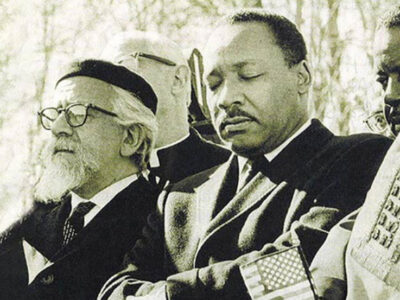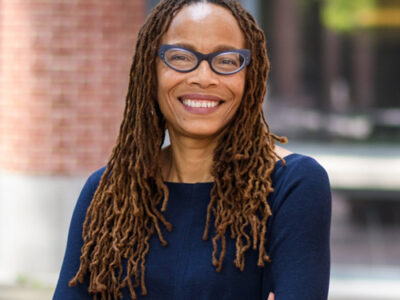“What’s your major?” may be a handy conversation-starter among undergraduates, but does the traditional model of higher education—in which students mostly study, and professors mostly teach, in clearly defined academic departments—have a future in a rapidly changing world where the biggest problems and greatest potential advances seem to require approaches that cut across traditional fields of knowledge?
That issue was a major thread in the third annual Founders Day Symposium—“Aristotle’s Brain: Integrating Knowledge in the 21st Century”—held in January and sponsored by the Faculty Senate in a revived commemoration of Benjamin Franklin’s birthday. The panel discussion, moderated by President Amy Gutmann, featured four of the University’s Penn Integrates Knowledge (PIK) professors: John L. Jackson, Jonathan D. Moreno, Christopher B. Murray, and Adrian Raine.
Gutmann had promised to moderate “in a rather immoderate way,” and when she posed the question, “Does the integration of knowledge mean we should break disciplines and, if so, should we be working—I’ll say this softly—to abolish departments?” there was a momentary hush, as if the audience half-expected a horde of deans, chairs, and other academic-turf-protectors to burst in and restore the established order.
As it turned out, only Raine—the Richard Perry University Professor with joint appointments in the School of Arts and Sciences’ criminology department and the School of Medicine’s psychiatry department, whose comments had prompted Gutmann’s formulation in the first place—seemed seriously tempted by the prospect. The other panelists came down on the side of more or less preserving the existing academic structure.
Raine’s own unconventional professional history—he and Gutmann joked about his “semi-dysfunctional youth,” and his work experience includes stints as a prison psychologist in England and as an accountant for British Airways—seemed to have left him exceptionally skeptical of institutional orthodoxies. “Part of me thinks that to integrate knowledge we first have to break down disciplinary doors that keep knowledge in,” he said. “We’ve got to be iconoclasts and ask the impertinent questions to get pertinent answers.”
Murray, another Richard Perry University Professor, with appointments in inorganic, nanoscale, and materials chemistry in SAS, as well as materials science in the School of Engineering and Applied Science, talked about how the creation of various centers and institutes can complement existing academic departments. Such organizations “provide the opportunity to reach beyond [disciplinary] boundaries,” he said. “We need that outlet where we have a sense of community separate from the department or organizational structure, but I wouldn’t go so far as to eliminate them.”
The first PIK professor to be appointed, cultural anthropologist and documentary filmmaker John Jackson, Richard Perry University Associate Professor of Communications (Annenberg School) and Anthropology (SAS), emphasized the need for less defensiveness over departmental turf, and a greater openness to cross-disciplinary “conversations.”
“Being interdisciplinary is not an attempt to dissolve the validity of fields, but you can have both of these things at the same time,” he said. “The most interesting departments across the University are those that are fearless about engaging in those conversations.”
Bioethicist Jonathan Moreno, the David and Lyn Silfen University Professor, whose appointments are in medical ethics in the School of Medicine and the history and sociology of science in SAS, described his two departments as “inherently interdisciplinary fields” and yet emerged as perhaps the staunchest defender of traditional academic arrangements—citing his own debt to philosophical and other texts of the past in pondering current issues such as stem-cell research, for example.
He also pointed to the tendency for intellectual energy to be “siphoned off” into centers and institutes of the type Murray cited approvingly. “This is something that people in medicine and science worry about a lot,” he said, with the concern being that departments not “become administrative husks.”
More broadly, he argued, departments are needed “to remind us of where our disciplines have been. Disciplines have been pounded out with important texts and problems and intellectual frameworks that are still useful.” He added, “Students need to start out with that.”
But while a common pattern in intellectual development is to gain grounding in a particular field and then branch out, the current academic model may penalize early bloomers, Murray said. Drawing on multiple disciplines for their work is relatively easy for him and his high-achieving PIK colleagues. “The real challenge is to hire assistant professors.” The practice in academic hiring of slotting individuals into particular departments has meant that some talented, creative people have been lost because their research interests and work could not be so neatly categorized.
Raine took the point even further down to the undergraduate level. “We make students [pick a] major to have some depth. Why?” he said. “How about students not majoring in anything at all?” Young people today and in the future may live longer than humans have in the past, with more time and opportunity to integrate knowledge over a working life that may include jobs in multiple fields, he added. “Who wants to be an accountant for 80 years?”
Jackson pointed out that it is the students who often push departments to integrate knowledge—a development that is further along at Penn than many other places, given the University’s plethora of combined programs and majors, he added.
Asserting that kids “pick up what they need,” Murray recalled his experience as a recruiter for IBM, in which he sought out applicants who showed adaptability and were able to “rise above the noise,” and who would thus be well-suited to tackle multiple careers or operate in a fast-changing industry.
Jackson also noted the importance of “unlearning” as a way of integrating knowledge, to embrace the idea that a lot of what you “know” will turn out to be wrong. (Panelists estimated that roughly 80 percent of what they teach in their own classes may be incorrect.)
In his own work, Jackson said, taking an interdisciplinary approach is not an abstract goal, but “project-driven,” growing out of the problem being studied and the kind of answers being sought. “I come to my present academic identity simply as a function of the fact that I wanted to answer specific questions—to theorize the world in a particular kind of way,” he said. “And I imagined I could theorize in images and sounds differently than I could on the printed page.”
For Murray, the challenge is to “determine what’s worth knowing” in order to “uniquely attack” the problem at hand. “There are fundamentals you can find that are universal between hard systems, and the physics of devices, and chemical techniques,” he said. “It really does drive you to think, ‘What are those areas I need to understand to attack this problem?’ and not be bound by traditional lines of teaching that you may have been exposed to.”
“It’s an issue of filtering,” Moreno said. While Aristotle may have been the last individual to know everything there was to know—in the Western world, at least—the present and future challenge is figuring out “what resources do we need for a problem and when [do we] stop looking?” he said. “When do you stop doing research and when do you start writing?”
Integrating knowledge is a “very challenging enterprise,” said Raine. “What we all agree on is that the motivation is to address the problems—to actually be able to say something relevant to the world.”
—J.P.




